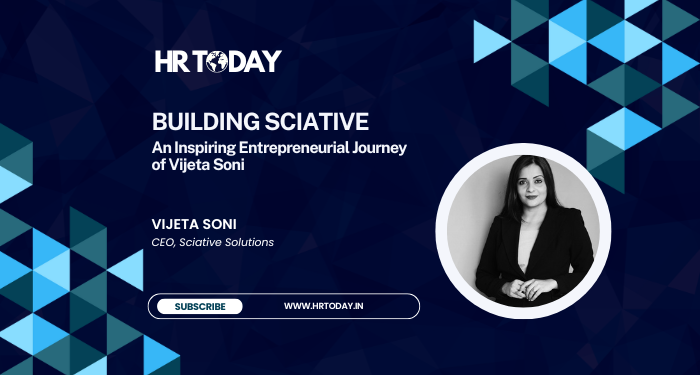
Helena Demuynck
Managing Editor
Welcome to Leaders Speak, an HR Today initiative. My name is Helena Demuynck, and I am your host today. I am thrilled to be here with Vijeta Soni, who has an amazing track record. Welcome, Vijeta. I am so, so thrilled that you are here. You’re going to share your insights as an executive in corporate and as an entrepreneur. Please start by telling us a little bit about yourself.

Vijeta Soni
CEO, Sciative Solutions
Hi Helena, It’s a pleasure to be here with you on this podcast. A little about me: I have always been a very curious soul since childhood. Every time, it has been about understanding in depth whatever I’m working on. So whether it is on the education side or whether it is about understanding how humans work and how friendships happen, why do people behave in certain ways? So that curiosity of why has always been there with me. That has taught me a lot of things in my life.
I come from a background that is more of a business setup. So, while my father is from IIT Bombay, he and my mom have always been very much involved in the entrepreneurship side. Entrepreneurship has always been in my mind, and in the end, whatever happens, my focus should always be on building something of my own so that I can impact a lot of people on a massive scale.
To do that, it is also very important to know that we need to experience many domains, many, many corporates, many regions, and many departments so that we start learning the whys of those areas as well. This way, when you’re doing something of your own, you have some level of knowledge and experience and don’t feel that ambiguity when that circumstance happens in your own organization. So, I have always been involved in different types of organizations as part of my corporate.
I am an alum of IIM Bangalore, and I did my second master’s from the University of Houston, Texas. I have worked in different companies, from manufacturing and education to beauty and e-commerce retail. Then, I returned to India and started working with one of the largest private sector companies in India. I started leading the technology side and was one of the youngest female vice presidents in the leadership role, looking into the technology side of that company.
Technology and digital transformation have always fascinated me because I knew that they would be very transformative. The way humans will work will be in adjoining, in collaboration with technology. So, digital transformation has always been a core area for me. Then, after my career in the corporate side, I, along with my other company founder, started Sciative Solutions.
This is predominantly an area that is very untouched. We look into the pricing side. It involves a lot of mathematics and data sciences to understand how the pricing of products and services can be automated through products so that robots can make decisions on behalf of humans to bring in more profitability, revenues, and margins for larger corporates. So, this is a very transformative journey in any organization.
So we took up pricing and then technology, combined them, and built Sciative.

Helena Demuynck
Managing Editor
Beautiful. If I understand correctly, your idea was to become an entrepreneur, and you have planned your complete corporate track to build the experience and leadership to do so. Is that correct?

Vijeta Soni
CEO, Sciative Solutions
Absolutely. So what happens is that many times, um, the idea clicks to you when you’re very young. But then there are times when you are always on the hunt for an idea. You’re always on the hunt for that one single problem, which is going to be having a very large market share. And that hunt is complete for different people at different stages in life. And while you’re hunting, it is very important to keep experiencing multiple things, multiple domains in your life.
So, one day, you’ll find that hunt of yours completed, and then you’ll start up your own journey.

Helena Demuynck
Managing Editor
Yeah, exactly. And I love that you mentioned curiosity as a basis for your track records and your paths. I would say curiosity is a kind of leadership skill because it allows you to stay open, alert, interested, not judgmental, and really see opportunities for what they are. So I really liked that. Yeah. Yeah. And so you have held senior roles at large companies, and then you started your own company.
You’re involved in other projects as well. We may talk later about that, but what are your major insights about leadership from these different experiences?

Vijeta Soni
CEO, Sciative Solutions
According to me, leadership requires a lot of patience. So you have to be curious and ask a lot of questions, but asking those questions means that you have the patience to listen to the answer or find the answer.
A leader has to be patient in what he or she is doing. That patience helps in multiple forms. Number one, your interaction with someone gets enhanced. So, while you are curious, you’re asking questions. And when you’re even trying to find out the answer, the person feels respected. So, if I’m talking to you and asking you a lot of questions about how you do these things, How do you make it work?
And if I don’t have the patience to listen to what you’re saying, that’s absolutely not fair.
So that’s one of these smallest examples, but patience is one of the most critical characteristics of a leader, especially in startups. In India, more than 80% of startups fail in the first year of their incorporation. Predominantly, it happens because the leader is not very sure about what idea they are working on.
They did not mull over it. They did not show a patient thought about whether something was going to work or not. Will it have long-term sustainability? So, unless you have that patience, you won’t be able to succeed. So, leaders need to have patience.
I have seen so many leaders in my life who have shown that patience, and they have made their mark in whatever department they have been working in or whatever role they have been playing.

Helena Demuynck
Managing Editor
You started your own startup and are also an angel investor. What advice would you give to women entrepreneurs on fundraising and building successful startups?

Vijeta Soni
CEO, Sciative Solutions
I have some very powerful women in my family. For example, my mom, she’s a YouTuber. After becoming a senior citizen, she started her own YouTube channel, and she’s a very successful YouTuber. While I’ve seen so many successful women in my life. Women take care of the entire finances of the house when they are looking into the expenses side. What I have learned is that when it comes to entrepreneurship, understanding the finances of your own organization, what kind of cash flows you have, and where you are spending a lot.
Will this deal be a profitable deal or not? Looking into all of these things, a woman entrepreneur needs to be very closely involved into it. And many times, I see that women entrepreneurs may or may not directly get involved into looking at the financial side of their organization. There are very few of them who are doing very well, but those are the women who have always got involved into the financial acumen of their organization.
So, while yes, the business is very important, Your product is very important. The way you handle your people is very important. What culture you are building is very important. But more than that, you also need to understand the profitability, the stand of your organization. Where exactly do you want to head it towards? So that financial acumen is very critical for a woman entrepreneur.

Helena Demuynck
Managing Editor
Yeah. And that is something that you don’t see often in startups, and that you’re missing, actually. As a woman leader, have you faced unique challenges in corporate life, setting up your own business, or investing in angel investments? Have you seen challenges that are really, or that you would relate to, being a woman and having a more female approach in leadership or approach in life in general? What challenges have you seen there?

Vijeta Soni
CEO, Sciative Solutions
Both in corporate and in your own entrepreneurship, you end up reading a lot of articles. There is so much written about breaking the glass ceiling and making your own mark. It’s very difficult in the male-dominated world. Yes, there are certain sections in corporate life where you will find out you will interact with some individuals of different genders who may not be immediately receptive to accepting you as a woman leader.
In my role, I have led some people who are even older than me, much older than me, and who are of a different gender.
Yes, absolutely, there is some level of reluctance. But I think so, and it’s not just because of being a woman. It’s about getting into that age as well. When you start attaining leadership at a very young age, you do sense that retaliation. However, that absolutely comes to a halt when you’re speaking with your mind, when you’re very thorough with your foundations, when you’re very thorough with the numbers, when you exactly understand what the business is all about, when you understand how technology is getting used there or what kind of upgrades are you going to be building within that system.
And you have the whole story narration very clearly planned out in your mind. You do see a retaliation, but once they start understanding, once the teams that you are working with or even the external department people that you’re working with, once they start understanding the potential you have, then there is no gender biases because then you’re talking like an equal. It’s about just certain prejudices that people might have about women leaders.
But once you start making sense, once you are very thorough with your homework, with your knowledge directory, you automatically start gaining respect. And that actually happens with males as well. I mean, if you are interacting with a guy at a conference and the person is absolutely not making sense, You might behave in the same way. I mean, it’s not looking at the gender side. I mean, it’s about your mind, what kind of intelligence you have, what kind of intellect you have and what, what, how, how you speak, and how you treat others.
That it all boils down to those foundational principles.

Helena Demuynck
Managing Editor
Absolutely, it is about building credibility and authority, and you were talking about this glass ceiling, and a lot of us put this glass ceiling in the organizational level, so it’s like an organizational glass ceiling, and we forget that we have our own glass ceiling, that we have our self-concept and that it is that we can also start to show up as a leader and to build our narrative and to build our story and to celebrate our successes and to stand there.
This is a self-concept and a glass ceiling concept that we do not look at enough in terms of how to manifest ourselves as leaders, even in a male-dominated setting, because I also like the additional challenge that you said and that it’s not only it’s not gender. There are a lot of other things that are implied when you are showing up as a leader, but especially age is also a very interesting one because more and more, we get into situations and organizations where younger people lead more senior people, and also, there is like okay how are you establishing that leadership and show that you know what you’re talking about and build that credibility.

Vijeta Soni
CEO, Sciative Solutions
The times are changing, the times are really changing. I mean, 15 back or 20 years back, things were very different in the organizations. Today, People around you are very receptive. They are very receptive to your ideas. You are living in a different world now. The same baggage we have been carrying as a woman, you cannot do these things, and it isn’t sustained anymore in today’s time. There have been discussions about women not getting equal pay as males, but that’s not the case now.
If I hire a smart software developer, it is very important for me that the person has great algorithm skills. It might be a male or a female. I mean, that’s an equal opportunity.

Helena Demuynck
Managing Editor
How do you think companies and maybe also yourself in your own organization can create more opportunities for women in technology and leadership? What needs to be done more? You can say that this is indeed changing, but I see a lot of women, and I hear a lot of women who are still struggling.
I also see many organizations telling me they have an issue with recruiting and retaining women at higher levels. We even have an issue with our pipeline: We don’t get our pipeline filled. So, what solutions or strategies could counter that?

Vijeta Soni
CEO, Sciative Solutions
How do you do it?
There are certain things that are inevitable. For example, if there is a woman who gets married after a few years, she will, of course, have, she may, I mean, most, I mean, the highest probability is that they will start a family.
It is very important for organizations to understand the social fabric of where they’re operating.
Depending on the country, the role of a mother or a woman in their homes is very different. In certain countries, both males and females have the same amount of responsibility. However, in some countries, a huge amount of household-related work, chores, and nurturing a baby falls on the shoulders of the woman. So, depending on which organization is part of what social fabric, you need to start developing and devising your policies around that.
So, if I’m in a country where the woman will have to take care of the baby for a longer stretch of time because she may not have somebody to support her at home, I need to be having my policies around maternity very compatible to ensure that once she’s able to complete her duties towards that baby, when she returns back to the work, what kind of receptive environment is created for her. So, depending on which location I am in, the HR of that organization should be cognizant and empathetic enough to design policies to take care of both sides of the gender, whether it is for males or for females.
Having diversity cells is very important. Any organization should have very detailed policies around how to maintain diversity within their organization. And when I say diversity, it is about women, it’s about age, and it’s about sexuality. So, ensuring that how, what kind of policies are you devising and also having very strong governance engines within your organization to ensure adherence to those policies as well.
So, depending on where you are situated or located or what industry you are in, your policies and procedures to empower women within your organization should be molded around that. The Human Resource Department plays a critical role in building an empathetic culture for the genders within the organization.

Helena Demuynck
Managing Editor
Then Vijeta, are you advocating for global companies that have different policies per country, depending on how they are organized in every country or in the different industries that they’re running? Most organizations have global policies, and it’s like a common nominator. It’s certainly not the best practice for every country.

Vijeta Soni
CEO, Sciative Solutions
Absolutely, because if I, as an organization, I’m working in multiple locations, multiple countries, I am not just working in that country, I’m working with the culture of that nation, and I need to be empathetic. So, for example, if McDonald’s when McDonald’s launched in India, they can change their product by bringing in masalas, which is more favourable towards the Indian taste buds; why can’t you have policies which are more favourable towards the Indian culture?
This is just an example. If companies are ready to modify their products, why not modify your policies as well, depending on which country you live in?

Helena Demuynck
Managing Editor
This is already an answer to the next question I have, but I guess that you can also find more things there. But based on your experience, what do you see as key priorities and strategies for the future of business and leadership in order to thrive?

Vijeta Soni
CEO, Sciative Solutions
Adoption to the changing environment. So, while this sounds very cliche, I mean, even like 15 years back, people were speaking about how you should be adaptable to change.
Given the situation that we are facing today and how the world is changing around us with artificial intelligence, new jobs are being created. The current jobs and the whole meaning of that job role are changing. How are organizations ready to adapt to technology and artificial intelligence? Not just thinking about adoption in terms of automation, but adoption in terms of Improving the overall productivity and profitability of the organization through technology and through artificial intelligence is something that leaders should be looking at.
Technology is not just a checkmark. It’s not just a check box. If I’m a senior executive vice president in an organization, and I just check a box saying, okay, we had to automate this process, and we had automated it. The story does not end there. The story comes to the following: If I have adopted that technology, what kind of ROI would I be able to bring with that technology adoption? So, adapting it and what impact we are creating with that adoption, both from the perspective of the human impact and impact in terms of the returns it is giving to the organization, falls on the plate of the leaders.
Today’s leadership has to be very adaptable because we are living in a different world. Three years from now, things will be so different than what we are seeing today.

Helena Demuynck
Managing Editor
Absolutely. This is accelerating all the time. So, where do you think that in terms of leadership, we will have to develop different leadership styles, leadership qualities, and leadership competencies?

Vijeta Soni
CEO, Sciative Solutions
Your leadership styles are going to be changing because the workforce which is entering today’s organization is purely Gen Z now. They think very differently. They are extremely emotional. They look for a connection. They look for a lot of empathy. They look for work-life balance. Plus, they’re also looking for excellent career growth.
They need communication, empathy, and a lot of nurturing. Their thought process is so different from that of previous generations, which I have seen in organizations. It is really important that how organizations’ leaders adapt to the new generation, which is now there working along, that generation doesn’t fear to speak up, especially coming from a country like India, where we always ensure that a younger one is not speaking anything be anything different than what the senior member in the team is talking of Here, this generation does not fear of that.
This generation wants to speak up. The generation wants to get noticed. And the leaders need to be having that empathy to understand this generation and receive it to make sure that the culture within the organization is always very fruitful and we’re able to bring in the best productivity from this emotional generation that has come into the workforce.

Helena Demuynck
Managing Editor
I love that because, you know, all the qualities that you just mentioned are the leadership qualities that are labelled as feminine leadership qualities. And I’m not saying that these are not to be found in male leaders. It’s just that these qualities have not exactly been very, very developed there because there’s other qualities that have been important as leadership qualities and also leadership styles in the last decades, although let’s say that in the last 10 years things have been changing, but what you’re mentioning in terms of the space for emotions, nurturing, connecting, having people, giving people the space to grow, to speak up, having the community.
These are all leadership qualities that have not really been on the top of the priority list when people are looking to recruit leaders. At the same time, there are leadership qualities that a lot of women have. And we had kind of to hide them, to oppress them, and to bring up our masculine leadership qualities in order to be able to play the game in corporate life. So what you are saying now is making it so clear that this is really time for women leaders to show up, to raise their voices, and to take up that responsibility to co-lead and to make sure that these other leadership qualities that this Gen Z needs in order to thrive that they are fully, fully, fully present in an organization, right?

Vijeta Soni
CEO, Sciative Solutions
That is so beautifully put.

Helena Demuynck
Managing Editor
That’s beautiful. Yeah. Because, I mean, how would you define these feminine strengths? If you’re looking at leadership in general, and I know that we are labelling, but we have been doing that for so long. So I think we should keep doing it in order to make things clear and obvious. If you’re looking at leadership qualities in your organization or in yourself as a leader, what are the feminine qualities that you feel that we really, really could develop and could nurture and could also sponsor in men in order to be able to really nurture also these new generations entering the workforce and entering organizations?
What’s your top three?

Vijeta Soni
CEO, Sciative Solutions
First thing is empathy, extremely important. You need to be highly empathetic. Women have a very high quotient when it comes to empathy. They start reading between the lines. They start understanding subtle hints and gestures that may be seen on the faces of the younger generation. So you need to have that empathy. You need to be very observant of what’s going on in their mind.
The second thing is adaptability. Women are very adaptable. They go from one family to the other, have babies, and transition continuously. So they’re very adaptable to the environment where they go. So adaptability is extremely important in both genders.
And the third most important part is Being pragmatic, women are very pragmatic. They’re very practical. They evaluate multiple things, and then they are like, OK, this is going to work out, may not work out.
They’re very pragmatic in what they do. As far as my understanding goes, the kind of women that I have interacted with have empathy, are very adaptable and are very pragmatic. So this leadership in this generation works beautifully well when I’m dealing with the new generation that’s coming in. You need to acknowledge them. You have to be adaptable to them. You need to have that emotional connection with them.
Only then will you be able to survive, and they will be; they will enjoy working with you. So it really works out very well.

Helena Demuynck
Managing Editor
There’s a fun element that is also very important, I would say, for those generations, but I would say, for everybody.
Research also shows that women leaders often have a more collaborative leadership style. Is that something that you see or that you experience?

Vijeta Soni
CEO, Sciative Solutions
Yes, when you say collaborative, I look at collaboration through different lenses. One is collaboration. When a woman is leading, she always thinks of either collaborating internally or collaborating outside her organization. Women build amazing networks. So outside the organization, women are able to build networks and even sustain those because women are great relationship builders.
We’re able to do that even within the organization. When I talk about collaboration, women are able to make collaboration; women leaders can actually make collaboration happen between different departments. So whether it is the tech department collaborating with the product department, collaborating with the business department or the HR department, women can; women leaders are able to seamlessly dwell through all of these collaborations and team members very, very fluidly rather than just thinking from one lens. I have really seen women leaders collaborate extensively, both internally and externally, in their roles.

Helena Demuynck
Managing Editor
I like that. Women are also said to bring a more holistic thinking style to problems. I mean, a lot of organizations, they just have silos, and they have them for decades. And I think this collaboration, combined with this holistic approach, is also a very, very strong, strong, strong competence.

Vijeta Soni
CEO, Sciative Solutions
Because as soon as you start bringing in collaboration, again, you need to collaborate with any person, any department, you again need to have empathy because you need to understand where this department is coming from because how a business thinks is very different than how the HR might think. How a tech department thinks is very different from what the finance department thinks versus the marketing department.
So empathy becomes very important. So when women leaders lead and drive the roles that they are doing, they are able to bring empathy in so that the collaboration starts becoming smoother. They’re able to understand each other’s perspectives and able to come up with common, mutually effective solutions, and therefore, you start breaking these silos. So, in the end, the silo, I mean, while you start collaborating, but if you’re not empathetic, the collaboration will never work out, and you build a bigger silo.
So it’s very important to have empathy when you’re starting to collaborate so that your collaboration becomes much stronger and lasts for longer. So that’s where those women qualities start impacting the overall relationship that starts getting built in an organization.

Helena Demuynck
Managing Editor
Something that I also see is when women are successful, when they thrive, when they are really making money, doing their business, one of the first things they start doing is to give it back, to pay it forward. And that is such a beautiful thing. It’s not about money, reputation, or having, but it’s about what we can do with that and also impact the world.
I’ve seen beautiful initiatives of women funding the education of young women in Africa or in South America or in Asia. These are things that always make my heart beat a little bit faster. What would it be that you do or that you would like to do in order to paying it forward? Because I know you’re an angel investor also, that’s also already a way to support other women who are on the path of making success and bringing entrepreneurship into the world.
What is your idea and feeling about paying it forward?

Vijeta Soni
CEO, Sciative Solutions
Giving forward, there are two areas which are very close to my heart. While in one of the areas, I have already started to work on it, the other area is completely untouched. But I would like to get into it. One is education. So when I’m looking into the way education happens, the way the system is created, the way students are taught, or how they are groomed for the future, I would like to see that a lot of impact of new technology should start coming into that education system, not just through e-learnings, not just through simulations, but the overall mindset about technology needs to be embedded in the education system.
And it starts with the professors. It starts with the teachers and how, at the nascent stage, you can build that awareness habit. So while I have started to work along with my son in bringing in more technology awareness in younger kids through my humble beginnings in the education sector, where I’m trying to help certain kids who are currently not in a position to afford learning tech skills.
So I’ve started investing a little bit there. One area which I would love to invest in, again, is driving to kids, but it is more towards the orphanages. I would love to do a lot of things for the girl child who is an orphan. So, a lot can happen. But I don’t know. I have not started working on it. But I’m pretty sure that my curious mind says that in the next four to five years, there has to be something that needs to be done for women, girls, child who are orphans.
Would love to do something in that area either through my organization or in my personal capacity.

Helena Demuynck
Managing Editor
That’s beautiful. You know what, by telling this and sharing this with us, you put like a seed in the world. There will be so many people hearing this, and maybe there will be somebody inspired or somebody doing something already there who will look at you and say, hey, that could be a beautiful collaboration. You never know what happens after this podcast goes live in that area.

Vijeta Soni
CEO, Sciative Solutions
Anybody who’s listening to this, if you have an idea, which is really helpful. Which will help out a girl child in the orphanages, please let me know. I would love to collaborate. And I would love to do something along with you so that we can build a major impact. And we can actually build some impact in the lives of those young girls. And we can give them an amazing future and a very secure future.

Helena Demuynck
Managing Editor
What a wonderful way to add this, to end this edition. Vijeta Soni, you rock. You are amazing. Thank you so much for sharing your views and for bringing this to the world. I’m sure that there’s so many people who will find the nudges of gold that you brought here. And I am so grateful that you took the time to share this with us. And I wish you and your team all the best in all your endeavors and impacting the world.
Thank you so much.

Vijeta Soni
CEO, Sciative Solutions
Thank you so much, Helena. Thank you so much. And it was a pleasure interacting with you.











